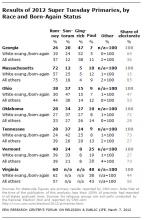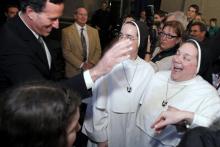Faith and Politics

U.S. Top Destination for Christian, Buddhist Immigrants, Study Saysl; Abdo Husameddine, Syria Deputy Oil Minister, Defects; Washington’s New Antiwar Movement; The Pentagon's (Preliminary, Shaky, And Hypothetical) War Plan For Syria; Arab Spring Fails To Allay Women's Anxieties; Progressives Petition Hoyer Against Safety Net Cuts; Carbon Fast 2012: Christians Give Up Carbon For Lent
Here’s how voter disenfranchisement laws work. In Tuesday’s Ohio primary, an 86-year old World War II veteran was turned away because his photo ID didn’t have his address. Paul Carroll, who has lived in Aurora, OH, for nearly 40 years had let his driver’s license expire. Knowing the need for a government-issued photo ID, he got one from the Department of Veterans Affairs. When he showed up to vote, the poll worker refused – the new ID card doesn’t have an address.
Carroll told the Cleveland Plain Dealer,
“I had to stop driving, but I got the photo ID from the Veterans Affairs instead, just a month or so ago. You would think that would count for something. I went to war for this country, but now I can’t vote in this country.”

New analysis by the Pew Forum on Religion & Public Life, based on National Election Pool exit polling conducted during the Super Tuesday GOP primaries, shows that Mitt Romney continues to struggle among the GOP’s white born-again/evangelical voters. He did win the evangelical vote in two of the seven states where exit polling was conducted: Massachusetts (where he served as governor); and Virginia (where neither Santorum nor Gingrich were on the ballot). In four states, Romney received significantly less support from evangelicals than from non-evangelical voters — continuing the pattern seen in previous caucuses and primaries.

Thousands cast their ballots in yesterday’s primary election and the results?
Things pretty much stayed the same.
Romney is still the front runner, Santorum the closest challenger, Paul continues his campaign to influence the GOP agenda and Gingrich is still Gingrich.
With the end of the primaries nowhere in sight, Democrats are smiling in remembrance to their own long drawn out fight between the Obama and Clinton campaigns during the 2008 cycles. While the preponderance of advertising and horse race coverage can be tiring, are these drawn out battles a good thing?

Extreme Poverty In The U.S. Has Doubled In The Last 15 Years; Veteran Poverty By The Numbers; UN Humanitarian Chief Arrives In Damascus; A Curious Exit Poll You Might Have Missed Last Week; Something New Is Happening In Greece; Rush Limbaugh And The Poisoning Of The GOP Brand; We're Underestimating The Risk Of Human Extinction; New Atheists Promote Bible Study?; More Than Two Dozen Vermont Communities Vote To End Corporate Personhood; Keystone XL Tar Sands Pipeline Won't Ease Gas Prices; Senate Must Reject It (OPINION).

The Obama administration is rejecting charges by the nation's top Catholic bishop that talks to modify a controversial birth control mandate are "going nowhere" because of alleged White House intransigence and efforts to diminish the central role of the bishops.
"The White House has put nearly every issue requested by the bishops on the table for discussion and has sought the views of bishops on resolving difficult policy problems, only to be rebuffed," an administration official close to the negotiations said Tuesday (March 6).
The official was not authorized to speak publicly on the negotiations and requested anonymity to speak candidly about the sensitive talks.

It seems lately that the Republican party is painting itself into an angry corner that it can’t find its way out of.
Rush Limbaugh’s recent loose-lipped “slut” comment is a clarion call to his significant conservative base to forge ahead in a direction that leads nowhere good. Basically, he cast negative, sexually charged aspersions at Sandra Fluke, a college student who publicly advocated for health insurance that included birth control.
As this piece in the Christian Science Monitor notes, his comments — and the greater sentiment they reflect — point to a sexual double-standard among many social conservatives. But that isn’t what is tripping up the GOP right now.
Anger is their Achilles heel.

Strapped for cash and staff, Rick Santorum has enlisted a ragtag but politically potent army to keep his campaign afloat: home-schoolers.
Heading into today's Super Tuesday, Santorum was urging home-schoolers to organize rallies, post favorable features on social media and ring doorbells on his behalf.
"Santorum has been very aggressive in reaching out to the home-schooling community, especially in the last month," said Rebecca Keliher, the CEO and publisher of Home Educating Family Publishing.
Drawing on his experience as a home-schooling father of seven, the former Pennsylvania senator has also sought to rally enthusiasm by pledging to continue that course in the White House.
"It's a great sacrifice that my wife, Karen, and I have made to try to give what we think is the best possible opportunity for our children to be successful," Santorum said during a March 1 campaign stop in Georgia. "Not just economically, but in a whole lot of other areas that we think are important — virtue and character and spirituality."

Poverty: Who Is Talking About It?; Pro-Life Argument Deserves Hearing In Mercury Ruling (OPINION); Rick Warren: 'Flat Out Wrong' That Muslims, Christians View God The Same; Who's Really To Blame For Apple's Chinese Labor Problems?; Timothy Dolan To Rush Limbaugh: 'Do It Civilly'; Foreign Policy: The Wild Card In 2012 Campaign; Beyond The Free Market; The Pastor And The President: A Tale Of Faith.

As a person who (loosely) identifies with the evangelical tradition, allow me to make a clear, unambiguous, declaration: GOD IS PRO-PEACE!
You may be thinking, “Just how exactly does a guy who claims to believe in the inspiration of Scripture arrive at the conclusion that God is pro-peace? Has this guy even read the Bible? Maybe he’s one of those amnesia-type Christians, the ones who read through the Bible every year as part of their daily devotions, and every time they get to the slavery and genocide passages, their mind goes ______________.
Maybe it wasn't those exact words, but whatever you were thinking, believe me, I get it!

Mitt Romney has trounced Rick Santorum, an ardent Catholic, among Catholic voters, but Romney's support among evangelicals has wavered thus far in the GOP presidential primary, according to a new analysis of exit poll data.
Though he won evangelicals in two states, in general Romney has performed 15 percentage points better among non-evangelicals, according to an analysis released March 2 by the Pew Forum on Religion & Public Life.
Exit poll data is available in seven of the 11 states that have held primary contests to date, according to the Pew Forum. More detailed religious affiliations are available in six of those states.
White evangelicals formed more than a third of all GOP primary voters in each state except for Nevada (24 percent) and New Hampshire (21 percent). Romney, a Mormon, won the evangelical vote in those two states, and nearly tied for first in Arizona and Florida. But he lost the evangelical vote badly in three states: Michigan, Iowa and South Carolina.
Somewhat surprisingly, Santorum has not won the Catholic vote in a single state in which data is available, according to the Pew Forum.

The Senate on Thursday defeated a Republican-led bid to insert a broad religious exemption into a federal mandate that requires most employers and health insurance companies to provide free contraception coverage.
The largely party-line vote was 51-48 in favor of tabling an amendment that Sen. Roy Blunt, R-Mo., had offered to a federal transportation bill.
Blunt and other Republicans had argued that the measure would protect the religious liberty of institutions such as Catholic charities and hospitals that object to contraception on moral grounds.
"It's not just the Catholic Church," Sen. Orrin Hatch, R-Utah, said during the floor debate on Thursday. "It's a moral and religious issue that should not be interfered with by the federal government."

'We Wish Like Hell We Had Never Bought': Voices From The Housing Crisis; One Nation Under Gods; Mass Appeal To Governors: Don't Privatize Prisons; “Green On Blue”; Obama To Iran And Israel: 'As President Of The United States, I Don't Bluff'; For America's Least Fortunate, The Grip Of Poverty Spans Generations; Inequality, Poverty, And Why We're Definitely Not Broke (OPINION); Jacksonville Lawmaker Says No 'Extreme Poverty' In N.C.

A small Minnesota church is finding out the high cost of standing up for same-sex equality — as well as an unexpected lifeline from the very people it decided to support.
When the Rev. Oliver White voted in favor of the United Church of Christ's endorsement of same-sex marriage in 2005, 72 percent of his predominantly African-American flock at Grace Community United Church in St. Paul couldn't stand with him.
The UCC's 2005 vote, he said, was "the beginning of the end of many UCC churches." Predominantly black churches like his suffered the most, he said, because the black community "was, and still is, very homophobic."
Because of White's vote, his church developed a reputation of being a "gay church" and people stopped coming. And stopped giving.

The Democratic sweep of Congress in 2006 and President Obama's election in 2008 convinced many people the religious right had been defeated and discredited. They believed it was time to "move on," a ubiquitous but dangerous phrase that often blinds people to unpleasant realities.
The truth, however, is that the religious right, Christian Reconstructionism and Dominionism have never gone away. And now they're back — "big time," as Dick Cheney might say.
In the 2012 presidential election, the Christocrats are out in force on many fronts: trying to eliminate prenatal care and all forms of contraception; defunding breast cancer screening; opposing civil rights for same-sex couples; contesting evolution and substituting creationism in public schools; denying the reality of global climate change; and discrediting the "lame stream media."

“Church folks are just too political!”
When people are asked why they have decided to leave the church, this has become an increasingly popular response. And, sadly, it is a particularly popular response for those in the 18-29 year old demographic. That we Christians have allowed ourselves to become too political and too partisan is a major contributor to the decline of the church.
Partisanship and its corrosive effects are not a new thing to the culture at large. However, more and more that cultural partisanship is infecting the church and gnawing away at the bonds which are supposed to hold them together. In the process, the church gets hijacked and redeployed for partisan ends, leaving those expecting better from the church disappointed.

When Franklin Graham expressed doubts about President Obama’s Christian faith during and interview on Morning Joe last week, it reminded me of an uncomfortable dinner I had in the late ‘90s.
I sat down for a pleasant meal in the home of two great friends — one of them a white evangelical faith leader deeply committed to social justice. Well into the evening’s conversation —when we’d dropped all our pretenses and our exchanges moved well past mealtime niceties — one friend asked me something that caught me entirely off guard.
“Do you think Martin Luther King, Jr. was a Christian?” he said.
I was dumbstruck. I had never heard anyone actually ask that question before.
“Yes,” I replied. “What would make you doubt that?”
As he explained, it became clear: My friend wasn’t sure whether Dr. King was a Christian because King’s Christianity didn’t look like my friend’s Christianity.

A group of Democratic-leaning Catholics on Wednesday (Feb. 29) released a 2012 voter guide that seeks to expand the concept of "pro-life issues" beyond abortion to also include war, euthanasia and poverty.
The nine-page guide from the group Catholics in Alliance for the Common Good — one of the first to be released for the 2012 elections — highlights economic issues as top concerns Catholics should weigh as they consider their vote.
The guide is markedly different from others circulated by conservative Catholic groups, which stress opposition to abortion rights as a non-negotiable stance for American Catholics.

WASHINGTON — The founders of the Republican Party saw Mormons as their enemies. And the first Mormon leaders didn't have much nice to say about the GOP, either.
You would never know it now — one recent poll showed three-quarters of Mormon faithful lean toward the GOP — but the two groups had an acrimonious start, fueled largely by the early Mormon practice of polygamy.
As Mitt Romney presses his bid for the Republican nomination for president, many Americans don't realize how his Mormon faith played an important role as foil in the early days of the GOP — and how its first candidates catapulted to power in part by whipping up anti-Mormon sentiments.

GDP Revised Up To 3 Percent In Fourth-Quarter; Why Foreign Assistance Is Still Important; Syrian Army Assaults Rebel Districts; Public Views Of The Divide Between Religion And Politics; What Did Congress Do To Combat Poverty In 2011? Virtually Nothing (OPINION); Environmental Justice A Form Of Social Justice (OPINION); Occupy LSX May Be Gone, But The Movement Won't Be Forgotten; World’s Extreme Poverty Cut In Half Since 1990; Poverty Resolutions, Microloan Nonprofit, Shows How Far $1 Can Go To Provide Jobs For Poor; Alabama Lawmakers Calls For Immigration Law Repeal.